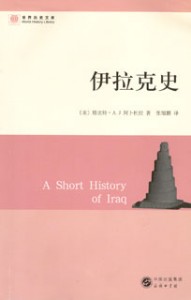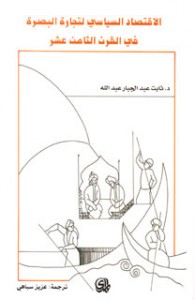Dear members of the history department,
Historians will want to join me in congratulating our colleague Thabit Abdullah on the appearance of his Mandarin translation of A Short History of Iraq
Here a brief description of the book:
Since the war in Iraq in 2003 and the consequent occupation of the country by British and American forces, Iraq has been the object of intense public scrutiny. Amid rising tensions in the Middle East, the importance of understanding the history of this country has only increased. Although often viewed as an artificial British creation with an inherently fractured society, Iraq has a long and sophisticated history of administrative and economic unity which created a firm basis for cooperation and coexistence within its diverse societies.
This unity still makes sense today despite the formidable problems of occupation, feeble state structures and chaos. Going right back to the roots of Islamic institutions in the medieval period, Professor Thabit A.J. Abdullah looks at the interaction of old and new, continuity and change, as manifested in social development, nation-building, the state and political opposition. By placing the country in its historical context, he shows that the current turmoil in Iraq is not simply due to the emergence of pre-existing social, religious and cultural divisions, but to the unraveling or weakening of social ties linked to a number of factors, including Ba’thist totalitarianism, wars, sanctions, and the destructive policies of the American-British occupation.
In this new edition, A Short History of Iraq has been fully revised throughout and now includes a new final chapter covering the seven years since the beginning of the Iraq war. Documenting developments leading to the fall of Saddam and covering recent reform and resistance, this chapter also addresses central questions such as the validity of American intervention and the future of Iraq. A Short History of Iraq serves as an essential historical guide to this fascinating and largely misunderstood country, as well as providing a searching commentary on an increasingly significant region of the world.
Also we should congratulate our colleague on the appearance of his Arabic translation of Merchants, Mamluks and Murder: The Political Economy of Trade in 18th Century Basra
Here a brief description of the book:
Using the case of the murder of a Jewish merchant in 1791 as the backdrop to this study of Ottoman Basra’s long-distance trade in the eighteenth century, Thabit A. J. Abdullah takes a novel comparative approach to Middle Eastern and Indian Ocean historiography. He examines three broad interrelated issues, all of which have a direct bearing on the case of the Jewish merchant. First, the overall nature of Basra’s trade is examined; second, the book looks at the city’s large wholesale merchants, the tujjar; and the third issue deals with the gradual development in Basra of the “soft areas” in Asian economies through which European articulation, followed by incorporation into the capitalist world economy, took place. The economic factors are then analyzed with respect to their political and social implications and the manner in which they affected communal tensions leading to the murder of the Jewish merchant.
On behalf of the Department, Thabit, many congratulations.
Marcel


